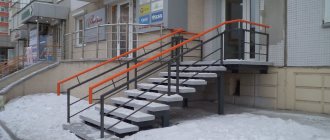Home » Housing disputes » Redevelopment » Consent of neighbors to redevelop an apartment - sample
1
Redevelopment of an apartment often affects the interests of neighbors on the landing, residents below or above. In such a situation, before starting repairs, you need to obtain the consent of your neighbors, since otherwise it will not be possible to legitimize the work performed (or obtain consent to carry it out). Read more about this in this article.
Is consent necessary?
Yes, consent is required. But this is not always the case, and much depends on what exactly the person plans to do, where he lives, what his special features are, and so on. A few basic examples where neighbor consent may be required:
- Redevelopment of common areas . Most often this concerns the vestibule. This room will occupy part of the site and therefore may affect the interests of neighbors. As a result, in order to do everything according to the rules, you need to obtain the consent of your neighbors to carry out such work. It should be noted that the vestibule is often created through the efforts of several owners of different apartments. For example, they can completely isolate their apartments from the staircase landing, creating one common vestibule for several apartments. Such premises are used jointly, maintained collectively, and so on.
- Combining an apartment with an attic/basement . First you need to remember that usually in the attic or basement there are general house communications, various equipment, and so on. If the owner plans to “take over” just such a premises, then he will not succeed. Even if there is the consent of the neighbors, regulatory authorities will not give the go-ahead for such redevelopment. The reason is very simple: equipment and communications must remain freely accessible to specialists. If the premises are not of particular importance from the point of view of maintaining the house, then they can, with the consent of the neighbors, be separated from the rest of the house and used for personal purposes. Often this requires purchasing part of the common space.
- Relocating a bathroom . The main problem with such work is that the bathroom cannot be placed above the living space. As a result, if such redevelopment is still required, you must first obtain the consent of the neighbors below. At the same time, agreement alone will not be enough. In addition, it will be necessary to agree that the bathroom will be moved in parallel in several apartments at once, so that it does not end up above the living space. Alternatively, neighbors may give the go-ahead for moving the bathroom if, after its placement, it ends up above another non-residential premises. For example, a pantry.
- Working with the facade of the house . Any type of work related to the facade, for example, expanding the balcony, creating a separate entrance to the room, changing the location or size of windows, and so on, must be carried out only with the consent of the neighbors.
Consent is required directly from the owners, regardless of whether they live in the apartment or not. If the neighbor-owner is a minor under the age of 14, then the parents/guardians sign instead. If a person is over 14, but has not yet reached the age of majority, he signs the consent himself, but in the presence and with the permission of his parents/guardians. Signatures of other relatives, tenants, etc. are not suitable.
Housemate Consent
The consent of housemates is required in all the cases described above and in many others where their interests are affected. This can be formalized either through a personal collection of consent from each co-owner of the apartment, or as part of a general building meeting. More on this below.
Consent of neighbors in a communal apartment
If it is necessary to carry out redevelopment in a communal apartment, slightly different rules apply. Formally, each room of a communal apartment is part of the entire apartment. As a result, the owners of each room are co-owners of the apartment as a whole. This means that any work on remodeling a room, regardless of whether it affects the interests of such neighbors or not, must be carried out only after obtaining consent.
Example: In a normal situation, moving or dismantling a non-load-bearing wall does not require consent from neighbors. But if the apartment is communal and the owner decided to divide one of the rooms into two separate rooms, the consent of each of the neighbors in the communal apartment will be required, but not the residents of other apartments in the same building.
Consent of the co-owners of the apartment
Any redevelopment in an ordinary apartment requires the consent of all co-owners, whether adults or minors. The general principles and features are similar to those described above. If at least one of the co-owners refuses to give consent, it will not be possible to approve the redevelopment.
Sample owner's consent to reconstruct a non-residential building
So far, such a claim has not been registered in the courts.
But another one was registered: the same entrepreneur later sued his neighbor and demanded that he demolish the same extension to the pharmacy on the same grounds. By the way, the district court upheld his claim, and now the owner of the pharmacy has filed an appeal to avoid demolition. But that's a completely different story. Thus, despite the absence in Part 2 of Art. 23 of the Housing Code of the Russian Federation, instructions on the right of a local government body to require the applicant to provide the consent of all owners of an apartment building at the stage of deciding the issue of transferring residential premises to non-residential premises, if such transfer is related to the need to carry out work on the reconstruction of the house or to providing the applicant with part of the common land for these purposes plot, provided that this land plot is transferred in the manner established by Art. 16 of the Federal Law “On the entry into force of the Housing Code of the Russian Federation” into the common shared ownership of the owners of the premises of an apartment building, then in these cases the provisions of Parts 2 and 3 of Art. 23 of the Housing Code of the Russian Federation must be applied in conjunction with the rules that provide for the need to obtain the consent of all owners or a decision of the general meeting of owners of premises in an apartment building.”
How to obtain consent from neighbors
As mentioned above, there are two main ways to obtain consent:
- Collection of consents from each neighbor . This option is relevant if the redevelopment affects only individual apartments and does not mean anything for all other residents of the building. The advantage is that you need to collect the consent of only individuals, but the disadvantage lies in the need to personally search for the owners, negotiate with them, agree on some concessions, and so on. Such consents are certified by a notary.
- General house meeting . If the redevelopment concerns common property (for example, “taking over” the attic), a meeting of all residents is required. It is clear that it will not be possible to gather absolutely everyone; many such meetings are simply ignored, but the presence of at least 2/3 of the owners is required. And it is necessary that at least 51% of those who come agree to carry out the work. The minutes of the meeting are also notarized and can be used instead of separate consents.
Sample consent of owners for redevelopment of an apartment or non-residential premises in 2021
- Only cosmetic finishing will be carried out inside the premises, including painting the walls, wallpapering, plastering the walls, etc.;
- it is planned to replace sanitary equipment with one of similar size, without changing the location;
- It is planned to carry out work on the installation/dismantling of built-in furniture elements that are not indicated in the technical documentation of the premises.
It should be noted that if a separate non-residential building or structure is subject to redevelopment, then in this case the legislation on urban planning activities applies in terms of approval of the reconstruction of capital construction projects.
Contents of consent
Consent is drawn up in free form. This document should contain the following information:
- Full name of the applicant (the one asking for consent).
- Registration address and apartment address.
- Neighbor data.
- A phrase about consent (something similar to “I give my consent to the redevelopment”).
- Date and signature.
All of the above is relevant for ordinary consent, but not for the minutes of a meeting of residents. In the latter case, you must act in strict accordance with the law, including drawing up a protocol. This is usually done by the person in charge of the house or a person designated as such.
Sample consent of owners for redevelopment of an apartment or non-residential premises
The decision to approve or refuse to approve changes in the configuration of residential premises is made by officials within 35 days. This period begins to be counted through knocks after registration of an application from a citizen.
To avoid the risks associated with making unapproved changes in the configuration of the apartment, citizens are advised to inquire in advance where to obtain permission to redevelop the apartment. According to Art. 2.4 Moscow GD dated October 25, 2021 N 508-PP, residents of the capital who are concerned about how to obtain permission for redevelopment can contact the Moscow Housing Inspectorate.
How to legitimize redevelopment using consent from neighbors
If you have the consent of your neighbors to redevelop an apartment located in an apartment building, it will be possible to coordinate the work or legitimize the repairs already completed. To do this, you will need to follow the instructions below.
Procedure
To approve or legitimize redevelopment, you need:
- Prepare a redevelopment project. If small, simple work is planned, then the owner himself can draw up such a project (it is called a sketch), but most often a full-fledged project completed by specialists is required.
- Collect other documents, including consent from neighbors.
- Contact any branch of the MFC (My documents).
- Fill out an application for approval of redevelopment and submit the remaining documents to the MFC manager.
- Get a solution.
- If the decision is positive and the repair has not yet been done, then it needs to be done.
- After the renovation is completed, invite the admissions committee.
- Receive an acceptance certificate.
- Make changes to the technical passport.
If it is not approval that is required, but the legalization of an already completed redevelopment, then after obtaining consent, you can immediately change the technical passport. It should be taken into account that during legalization problems often arise and instead of consent, a refusal is issued. With such a refusal, you can try to go to court and defend your rights. In the latter case, in addition to all the documents listed below, you will need to provide a claim, a refusal from the MFC and a receipt for payment of the state fee. Amount of state duty: 300 rubles.
Documentation
To approve the redevelopment, the following documents are required:
- Passport of the applicant and all co-owners.
- Consent for redevelopment from all family members who are co-owners of the apartment.
- Consents from housemates or minutes of a residents’ meeting.
- Redevelopment project.
- Registration certificate for the apartment.
- Extract from the Unified State Register and title documents.
- Power of attorney for the representative and his passport (if required).
Expenses
Costs that may arise during the approval of redevelopment:
- Project design: from 10 thousand rubles. Most often the cost is above 30 thousand rubles. Much depends on the complexity of the project and the region of residence.
- Notarization of consents of co-owners or neighbors: from 1 thousand rubles.
- Registration of a fresh extract from the Unified State Register of Real Estate: 300 rubles.
- Drawing up and certification of a power of attorney for a representative: from 2 thousand rubles.
- Making changes to the technical passport: about 5 thousand rubles.
Deadlines
Approximate time frame for approval of redevelopment:
- Project preparation: from 1 week. Most often 2-3 weeks or even several months.
- Collection of consents from neighbors: from 1 day. In practice, this procedure can take from several weeks to several months.
- Receiving an extract from the Unified State Register of Real Estate: about 3 days.
- Waiting for a decision at the MFC: up to 45 days.
- Making changes to the registration certificate: from 5 days.
Details, depending on scale
Redevelopment that does not affect the interests of residents of other apartments in the building usually does not cause conflicts or controversial situations, the resolution of which may require litigation.
But if general house systems are affected during renovation work, there are usually always a couple of dissatisfied people, and you can protect yourself from them only by having documented consent in hand.
Apartment
Consent for redevelopment is issued by the housing inspectorate, and the time frame for receiving documents ranges from 25–30 days .
But to collect all the documentation necessary to make a decision, the homeowner will need to visit the following organizations:
| BTI | The designer will need it to draw up a project (sketch) of work. |
| Project organization | A technical opinion obtained both from the design organization and from the author of the house project. If you plan to work with load-bearing structures, then only the author of the project can issue a conclusion. The package of documents must include the approval of the SRO of the project company. |
You should know that the construction company, which will subsequently carry out work according to the project, must also have the appropriate approvals and permits
House
In order to avoid conflicts between neighbors, their right to rest should be respected - according to the law, all repair work must be carried out only on weekdays from 9 a.m. to 7 p.m. Otherwise, their claims may be well founded. Particularly zealous lovers of silence often do not hesitate to go to court, and it is their claim that is guaranteed to be satisfied.
Also, when performing repair work, you should not go beyond the scope of the project. A striking example: the external unit of an air conditioner, installed without approval, annoyed a neighbor with its noise.
Having contacted the relevant authorities, the neighbor got the owner of the air conditioner to install a double-glazed window that would protect him from unnecessary noise. However, if the owner of a private house had received his permission in advance to install an external unit, then the neighbor’s claims would have been unfounded.
Non-residential premises
An apartment removed from the housing stock, in order to obtain maximum efficiency from its area, often needs redevelopment. Non-residential premises are classified according to their intended purpose, and often redevelopment requires so many different approvals that such work may simply be impossible for an untrained person.
In this case, it is recommended to contact a specialized organization that will carry out all the work to coordinate the redevelopment of non-residential premises.
Responsibility and fine for illegal redevelopment
Illegal redevelopment is a serious problem. In some cases it is difficult to identify, but if the work affects the interests of neighbors, you can easily report such redevelopment. In such a situation, an inspection will be carried out, as a result of which a fine of up to 2,500 rubles will be imposed on the owner of the apartment with illegal redevelopment. He will also be required to bring the apartment into compliance with the technical passport.
Even if the owner pays the fine, but does not comply with the order (does not bring the housing into compliance with the registration certificate), the redevelopment will still remain illegal. Ultimately, such real estate will be seized and sold at auction.
It is very difficult to obtain consent and carry out redevelopment according to all the rules. At a free consultation, experienced lawyers will talk about the main features characteristic of such tasks. They can also represent the client’s interests when interacting with neighbors, applying to the MFC, or even in court, if it comes to it.
FREE CONSULTATIONS are available for you! If you want to solve exactly your problem, then
:
- describe your situation to a lawyer in an online chat;
- write a question in the form below;
- call Moscow and Moscow region
- call St. Petersburg and region
Save or share the link on social networks
(
1 ratings, average: 5.00 out of 5)
Author of the article
Natalya Fomicheva
Website expert lawyer. 10 years of experience. Inheritance matters. Family disputes. Housing and land law.
Ask a question Author's rating
Articles written
513
- FREE for a lawyer!
Write your question, our lawyer will prepare an answer for FREE and call you back in 5 minutes.
By submitting data you agree to the Consent to PD processing, PD Processing Policy and User Agreement
Useful information on the topic
1
How to sell an apartment with illegal redevelopment
Sale of an apartment without the consent of the competent structures produced in it...
Unauthorized redevelopment when buying an apartment - consequences
In some cases, the new owner of the apartment finds out about the crime…
2
Sample apartment redevelopment project for approval
It is, of course, quite possible to remodel an apartment without a project, but the changes made...
13
Redevelopment in a private house - do you need permission?
Owners of private houses located on their own land have fewer restrictions...
Redevelopment of an apartment - where to start with the design
As you know, remodeling an apartment is a difficult task in itself...
1
Redevelopment of an apartment - what is possible and what is not
The standard layout of a living space (apartment) does not always suit the owner...
Registration procedure
First, you need to decide what exactly the owner wants to redo and understand whether what he wants is a cosmetic renovation or whether the conversation will be about a full-fledged reconstruction.
It is better to consult a specialist or get information about whether approval is needed from the architectural department of the administration.
If it turns out that the changes require approval, you will have to collect documents and submit them to the municipality; another organization that will need to be visited is the BTI. There you need to obtain a registration certificate for the housing, in which appropriate adjustments will be made after the completion of the alterations.
When carrying out simple alterations, you can draw up a reconstruction project yourself; for a larger-scale reconstruction, you need to entrust the preparation of the document to a professional.
The last step is to obtain a redevelopment act drawn up by a housing inspection specialist. The signed act gives the BTI employee the right to record changes in the registration certificate.
Sample owner's consent to redevelop non-residential premises
At the moment, federal legislation does not contain an interpretation of the concept of “reconstruction of non-residential premises”. The courts are guided by the legal position of the Supreme Arbitration Court of the Russian Federation, contained in paragraph 6 of the Resolution of the Plenum of the Supreme Arbitration Court of the Russian Federation dated July 23, 2021 N 64, according to which the norms of the Housing Code of the Russian Federation are to be applied by analogy to the relations of owners of non-residential properties. This conclusion was reached, for example, by the Federal Arbitration Court of the Moscow District in its Resolution dated November 1, 2021 in case No. A40-3926/13-40-37. By virtue of Art. 25 of the Housing Code of the Russian Federation, the reconstruction of residential premises is the installation, replacement or transfer of utility networks, sanitary, electrical or other equipment that requires changes to the technical passport of the residential premises. Redevelopment of a residential premises is a change in its configuration, requiring changes to the technical passport of the residential premises. That is, reconstruction and redevelopment work always entails changes to the technical passport of the premises. The tenant should check his plans for modifying the premises with the technical passport. It may also turn out that this will simply be an improvement of the premises, which does not require approval from the authorized local government body. In judicial practice, “improvements are understood as works of a capital nature that increase (change) the quality characteristics of an object, that is, improvements are associated with modernization, reconstruction, completion, additional equipment of fixed assets” (Resolution of the Federal Antimonopoly Service of the East Siberian District dated June 25, 2021 N A19-14583 /08-15-F02-2863/09 in case No. A19-14583/08-15). Improvements to the leased property must be distinguished from its redevelopment, re-equipment (re-equipment), which can only take place with the consent of the lessor. The Federal Arbitration Court of the Moscow District also came to this conclusion in its Resolution dated November 1, 2021 in case No. A40-3926/13-40-37. I will quote the Court's statement in more detail: “. since the courts actually established the reconstruction and redevelopment, including the construction based on the three stages of the above-mentioned building, the cassation court comes to the conclusion that the tenant violated the terms of the lease agreement in a significant manner, since the defendant carried out the reconstruction and redevelopment of the leased premises without the consent of the landlord and without the appropriate permissions from the competent authorities premises. By virtue of Article 623 of the Civil Code of the Russian Federation, separable improvements to the leased property made by the tenant are his property, unless otherwise provided by the lease agreement. In the event that the tenant has made, at his own expense and with the consent of the lessor, improvements to the leased property that cannot be separated without harm to the property, the tenant has the right, after termination of the contract, to reimburse the cost of these improvements, unless otherwise provided by the lease agreement. According to the meaning and content of Art. 608, 623 of the Civil Code of the Russian Federation, improvements to leased property must be distinguished from redevelopment, re-equipment (re-equipment) of the leased property, which can only take place with the consent of the lessor, and in relation to real estate - also with the permission of the relevant public authorities. The conclusions of the courts of first and appellate instances that there are no grounds for terminating the lease agreement and the changes made by the tenant do not worsen the consumer properties of the leased property are erroneous, since re-equipment (reconstruction) and redevelopment without the consent of the lessor and authorized bodies cannot indicate an improvement in the leased property. “If it turns out that it is nevertheless necessary to make changes to the technical passport of non-residential premises, then tenants need to be guided by what is set out in the Housing Code of the Russian Federation, since, as is known, reconstruction and redevelopment are carried out in compliance with the requirements of the law in agreement with the local government body on the basis of the decision made by it (Part 1 of Article 26 of the RF Housing Code). To carry out the reconstruction and (or) redevelopment of the premises, the owner of this premises provides to the approval body at the location of the premises being rebuilt and (or) replanned a certain package of documents, the list of which is established by the authorized body. As an example, I will cite the order of the prefect of the South-Eastern Administrative District of Moscow dated 09/21/2021 N 1967 (as amended on 07/01/2021) “On the procedure for the preparation, execution and issuance in the “one window” mode of documentation for redevelopment, re-equipment, reconstruction work at non-residential facilities, for major repairs, repair and painting of building facades, structures and structures, for landscaping and use of the territory: “1. To obtain a decision from the prefecture of the South-Eastern Administrative District of Moscow: 1.1. On approval of redevelopment, re-equipment, reconstruction work on non-residential facilities - the applicant (individual or legal entity) submits the following documents to the prefecture's "one-stop shop" service: - application in the prescribed form; — power of attorney from an individual or legal entity to obtain a permit (if the applicant is a representative of an individual or legal entity); — documents confirming the authority of the head of the legal entity (if the application is submitted directly by him); — document proving the identity of the applicant; — a copy of the certificate of registration of a legal entity, certified in the prescribed manner; — a copy of the title document for the occupied premises and use of the facility (certificate of state registration of ownership, lease agreement, agreement for the right of operational management), certified in the prescribed manner; — a legal act of an executive authority authorizing a change in functional use (when refurbishment of premises); — approval of the balance holder (for state and city property objects), formalized in the manner prescribed by law; — approval of the owner of the property (for rented premises), executed in the manner prescribed by law; — project documentation prepared and executed in accordance with the proposed type of work, agreed upon and approved in the prescribed manner (the composition of project documentation, the list of approvals and the procedure for its approval are determined by Appendix 1 to the Moscow Government Decree of August 16, 2021 N 621-PP); — work schedule (except for measures to re-equip premises). “Let’s summarize what has been written. If, having analyzed the upcoming changes to the premises on your own or with the help of specialists, you come to the conclusion that this is not just an improvement of the premises, but rather reconstruction and redevelopment, then you need to inform the landlord about your plans, and then decide which local government body you should contact for approval and what list of documents he will require.
This is interesting: Will Debts on Loans for Russians Be Written Off in 2021 Resolution
The purpose of the bill is to create conditions for the development of entrepreneurial initiatives among young people in Russia by legislatively establishing tools and mechanisms to support youth business activity. As world experience shows, solving the problems of youth self-employment and the development of innovative initiatives is associated with the creation of a comfortable environment for the implementation of entrepreneurial initiatives.
Do I need approval?
The interests of neighbors are taken into account when redeveloping an apartment, not only located in an apartment building and owned by the persons living in it, but also in a communal or municipal one.
Without fail, the Housing Inspectorate will require their written consent to the work that the applicant wishes to carry out if it affects common property.
These may include refurbishment:
- partial staircase or entrance foyer;
- a balcony on the ground floor, when it is planned to be designed as an extension to the house;
- 2-3 apartments located nearby, in one room;
- attic, when an apartment located on the top floor turns into a two-level one (in this case, the consent of the owner of the house will also be required);
- arrangement of a new entrance with a porch;
- ventilation equipment that will be located on the outside of the house;
- other.
If the applicant makes minor changes that will not affect the interests of the residents, then their consent will not be required. Written consent must be obtained not only from residents who reside permanently or temporarily, but also from those who are absent, but who are owners, co-owners, main tenants of municipal housing (tenants), registered.
If the tenant is a tenant, that is, renting housing under a lease agreement, his consent is not required. Only adults must sign the redevelopment permit.
If the tenant is absent for a long time, i.e. does not live, went on vacation, study, or work in another city, then a representative can sign the consent on his behalf
. In another case, a letter of request and a consent form for signature will need to be sent to the place of his temporary stay.
If the apartment is pledged, i.e. a mortgage loan or another was taken out for its purchase, you will need to obtain permission from the bank.
The procedure for redevelopment of non-residential premises
There is only one difference in the implementation of these procedures, but it is significant. If changes are made to structures in a residential apartment building (ordinary high-rise building), written consent is required from all residents. If changes are made to a non-residential building, such consent is not required. Otherwise, the procedure looks the same - the redevelopment of non-residential premises involves three stages:
- The owner or tenant will be required to liquidate all objects associated with the redevelopment.
- They will also be required to compensate for possible material/moral damage to other owners in the house.
- Finally, until the end of the trial, the owner will not be able to dispose of the premises (sell, rent, exchange, etc.).
The procedure for redevelopment of non-residential premises
- a corresponding statement from the owner of the object;
- documents certifying the owner’s rights to non-residential premises;
- photocopy of documentation on the opening of the enterprise;
- consent from the company managing the building is necessary to confirm that there are no opponents to the redevelopment;
- photocopy of the technical passport.
After collecting documentation, you must contact the relevant authorities. The permit is issued within a month. It will be issued only in a situation where the work related to the redevelopment is agreed upon with the supervisory authorities.
Coordination of redevelopment of non-residential premises
It should be noted that if a separate non-residential building or structure is subject to redevelopment, then in this case the legislation on urban planning activities applies in terms of approval of the reconstruction of capital construction projects.
Good afternoon I am a tenant of non-residential premises on the first floor of an apartment building. There are N number of rooms inside the rented premises. Electricity is supplied at 380V. The house is 57 years old after a major renovation. Do I have the right to place email in each room? a stove and a bathroom with a shower without approval from the department and the BTI. If I don’t, what is the likelihood of this redevelopment being approved for me by the state? The number of rooms is 10, there is one bathroom to which it is planned to connect all rooms
Sample consent of owners for redevelopment of an apartment or non-residential premises
- Full name of the owner, his passport details and contact phone number;
- the address of the premises that will be redeveloped;
- obligations that the owner undertakes in connection with the redevelopment, that is, carrying out work in full accordance with the provided project;
- a certificate confirming the ownership of the specified property, or a drawn up social tenancy agreement;
- the time frame during which the relevant work must be carried out, as well as the obligation to provide access to housing inspection specialists.
- the owner’s consent must necessarily indicate confirmation that the other owner was previously notified of the planned renovation work and does not express any objections to the other owners of the apartment carrying it out;
- the owner’s consent to carry out repair work must be formalized through a notary;
- in the vast majority of cases, the procedure for obtaining the owner’s consent is carried out on the day of application, while the cost of providing this service will directly depend on what tariffs are set by a particular notary office;
- there is no validity period for this document, unless its text states otherwise;
- the need to obtain the owner’s consent to carry out redevelopment is required in order to subsequently coordinate repair work with the relevant city authority.
This is interesting: What is the minimum area of buildings that are subject to tax?
Consent of apartment owners to transfer residential premises to non-residential premises
So, in Art. 47 of the RF Housing Code enshrines the right to hold a meeting of all owners of building premises in the form of an absentee referendum, subject to the presence at such a meeting and discussion of issues on the agenda, as well as the adoption of a decision on them, by at least 50% of the total number of all owners or their legal representatives (quorum). In the absence of the required number of owners, all expressions of the will of the general meeting will not have legal force. Thus, absentee voting of the owners of premises is carried out by transmitting their decisions on voting issues (exclusively in writing) to the address specified in the notice of the meeting of owners. The owner’s decision on the issues put to the referendum shall indicate:
The protocol on the consent of the general meeting of owners of a residential building to transfer the apartment to a non-residential property is not included in this list. But, nevertheless, it is necessary to take into account the provisions of Art. 36 of the Housing Code of the Russian Federation and Article 290 of the Civil Code of the Russian Federation. According to which, with the exception of apartments, all premises (stairs, attics, technical floors, etc.), equipment of the house (technical basements, roofs, electrical equipment, etc.), as well as the plot of land on which the house is located are the common shared property of the residents. Therefore, based on the provisions of paragraph 2 of Art. 40 of the Housing Code of the Russian Federation and paragraph 1 246 of Article of the Civil Code of the Russian Federation, when the reconstruction of the premises is impossible without adding part of the entire common property to it (when installing an additional entrance, etc.) or when the facade of the building changes (the size of window openings changes, etc. ), and also if the load-bearing structures of the building are affected, then it is necessary to seek the consent of all owners to transfer the residential premises to non-residential premises.








